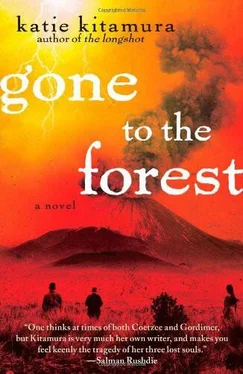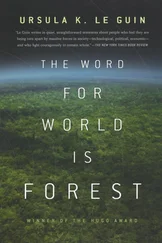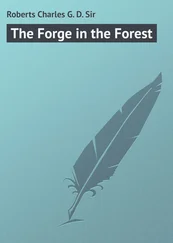Tom sits down in his father’s armchair. The house is quiet. He looks at the papers that are scattered on the floor — he had upended drawers in his search. He picks up the papers again. There may be something he missed. Bank details. Offshore accounts. Hidden and electric treasure. He is not avaricious but he is human and practical despite himself. He stands up and goes to the desk. He looks at the papers — he reads them for the first time. He sets them down again.
He does not really understand. Tom does not have a head for such things. He is not accustomed to the idea of the world outside the farm. Tom has no inflated sense of his personal capacities, he is not unusually arrogant, but he believes his world will hold fast. The idea that changes in the world outside the farm — the idea of the world outside in the first place — that together they can shift his personal landscape, that is one, two, three leaps too many.
Tom does not know about appeasement. He does not know about the deals that are made. Expropriation is not a word in his small — small and shrinking, shrinking with each moment — vocabulary. He does not know that people can send you notices and the notices are not just pieces of paper but pieces of paper that have real meaning in the world.
Real meaning as in: I show you this piece of paper and you have one month to go. Real meaning as in: I show you this piece of paper and the property you think of as yours is no longer the property you think of as yours, the property you think of as yours is something else entirely.
According to the papers most of the land no longer belongs to them. The papers (and the maps, there are many maps in amongst the papers) delineate the new acreage of the farm and it is dramatically reduced in size: the ten-mile spine has been lopped at both ends and only ten thousand acres remain. The negotiation has happened, the expropriation has begun. The land is being taken from the white settlers. The trees and hills have picked up and gone, they have packed their bags and departed down the track.
Like his father. They are gone in exactly the same way. Tom picks up a map indicating the new lay of the land and then drops it. It falls to the floor and crumples. Ninety thousand acres gone! He will need to ask his father what to do, only his father will know. But the old man is nowhere in sight. Instead there is just his signature, on the bottom of page after page after page.
His father is not moved by malice, Tom thinks, just by self-interest. His father being the most selfish man that ever breathed. For the first time Tom understands this. Only his mother was as selfish as the old man and that was why they did not love each other but were tied together in ways they half understood and fully resented. The two of them were the same in the end. They went in the same way. First the mother had gone by way of sea. Now the father has gone by way of land and the son is left alone.
Tom returns to the veranda. The servants have disappeared and the place is quiet. So here he is. The farm is his at last. He looks out to the horizon and he is terrified. The world outside, beyond its borders. He sees the three men and the documents they were examining. He sees his father reading the newspaper. The knotted grip of his hands. Tom has always been slow to understand. The men were not there because of what happened to the girl that night. The men only being messengers for something else. It had nothing to do with her. No man ever stayed because of what happened to a woman.
They stayed for other reasons. And now they are gone and the land is also gone. All that is left is the papers. The papers and with them the people who will come to claim the land. How will it happen? Who will come? Tom’s laughter pierces through the air. The world is shrinking to a piece of paper. A white sheet pinned to the line and the sound of it thwacking against the wind. The land will cave. The paper is going to tear. And him, still here.
There were six barns on the farm. They were simple structures. A knocked together wood frame, covered in sheets of metal. Each barn had a plastic gutter along the roof to let off water when it rained. The six barns stood in the middle of fields and were spread across the property. Inside were bales of hay, tools and spools of wire fencing.
The spools of wire were taken first. Then the shelves were emptied of their tools. These items were lifted in the night and carried away. Their only trace being footprints in the grass and tracks from where the spools had been rolled. The barn door carefully closed behind them.
A week later the bolts were knocked out and the doors disappeared. The barns stood with their entrances gaping, six barns spread across the property without a door to lock or close. The barns circulated air. Nobody took notice. There was a hush. It was long and extended. It was exactly two weeks before the windows disappeared.
They were glass and therefore valuable. For these they came with gloves and dirty quilts, into which they packed the panes as they knocked them from the frames. They returned for the frames the next day, having realized that these were also necessary. They cut them out with saws and went away by daylight, carrying the wood tucked beneath their arms.
The gutters were next to go. The plastic pipes were pulled down from the roofs and carried away. Then sheets of corrugated metal were dismantled and vanished square by square. Holes appeared in the barn sides. Entire walls were lifted away. Eventually each of the six barns was reduced to a bare wood frame. Like skeletons with the flesh burned away.
Finally even the frames went. The wood — some of it rotten with age and damp — was taken, along with scraps that had been abandoned in the grass. Hinges and bits of metal hardware. After a brief pause, the nails were also stolen up, gathered in their palms. They were secreted away until all that stood in place of the barns were stacks of hay. These rotted in the rain.
That was the prelude, which took place in the month following the land reform announcement. Which was broadcast on the radio and published in the newspaper, the news of it spreading like water. The whites being expulsed from the land in so many inches of ink and paper. The land shifting alliance across radio waves.
Then came the thing itself. He saw them through the window. Coming with their single wagons and mules, a tide of rusty instruments. The first thing they did was mark out boundaries with the barbed wire and wood from the barns. Dozens of parcels, one not to be confused with the other. A hundred people colonizing their own land in a fever.
The land bent and buckled under the weight of the new men. They overturned the earth in a churn of activity, demonstrating how property was the thing most worshipped in the country. This being the first legacy of the white settlers. This being what the natives had learned.
He had dismissed most of the natives in the days following the announcement. There remained only a few dozen. These natives watched as pell-mell the farms went up on the hills around them. Each new farmer was given three cows and five sheep and a burlap sack of seed with which to start operations. The soil, now rich with ash, was plowed and the seed dumped into the ground. The livestock corralled into the corners of the plots and the houses hammered together with the weathered squares of corrugated metal.
In all the effect was — not what they were used to, and not especially felicitous. The natives shook their heads. They could leave the farm and put their names down for their acre and their three cows. Others had done so. But they decided against it. They were hedging their bets. They were waiting for something more, and did not believe this was the end of the matter.
Читать дальше










